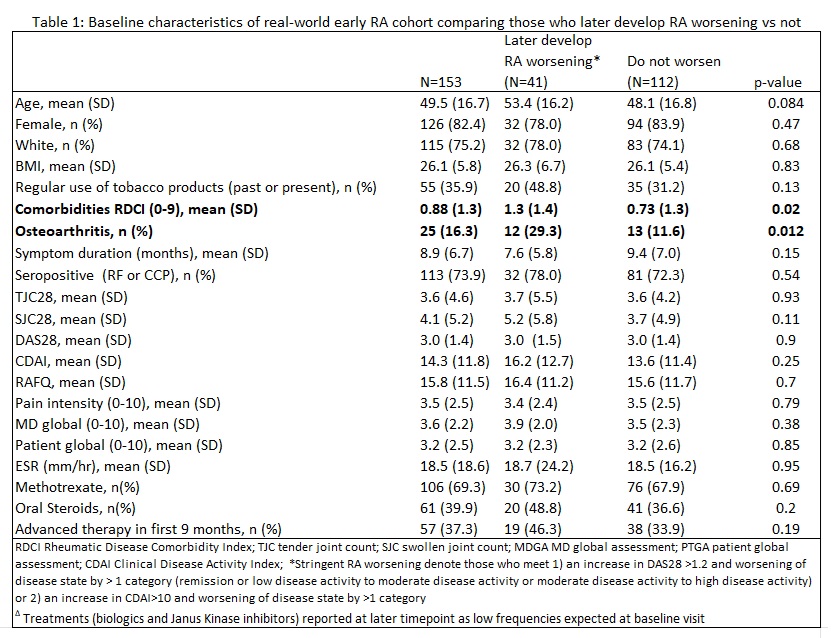Session Information
Date: Sunday, October 26, 2025
Title: (0430–0469) Rheumatoid Arthritis – Diagnosis, Manifestations, and Outcomes Poster I
Session Type: Poster Session A
Session Time: 10:30AM-12:30PM
Background/Purpose: RA disease worsening contributes to joint damage and cardiovascular disease. While measures of improvement are established in RA, we do not have uniform definitions for disease worsening. Robustly identifying RA disease worsening reported by clinicians and patients could facilitate future translational studies of its pathophysiology (i.e. using -omics data). The OMERACT RA-FLARE questionnaire (RAFQ) is a valid patient-reported outcome (PRO) of RA worsening. Patients reporting they were “a lot worse” had a mean RA-FQ increase of 8.9 points1. We aimed to evaluate associations with stringent definitions of RA disease worsening using composite clinical outcomes and the level of change in RAFQ, in order to understand if the RAFQ could be used to identify subjects with clear RA worsening and whose samples to include for translational studies.
Methods: Patients with early (e) RA (symptom duration< 2 years, CDAI >2.8) enrolled in the Consortium of Early Arthritis Cohorts US with > two recorded CDAI or DAS28 measures from >2 separate protocolized visits. We defined stringent RA worsening using 1) DAS28: an increase in DAS28 >1.2 and worsening of disease state by > 1 category (remission or low disease activity to moderate disease activity or moderate disease activity to high disease activity) or 2) CDAI: an increase in CDAI>10 and worsening of disease state by >1 category. To further ensure stringency, patient outcomes and change in RAFQ scores were compared between their pre-RA worsening visit (one with the lowest DAS28 or CDAI score before worsening) and their designated RA worsening visit (one with the maximal DAS28 or CDAI score) using paired t-tests. An alpha of 0.05 was used to determine statistical significance. All analyses were done using STATA version 18.0.
Results: The 153 eRA patients were mainly White (75%) women (82%) with a mean (SD) age of 50 (17). Initial DAS28 was 3.0 (1.4), and CDAI was 14.3(11.8). Most (70%) received an MTX (Table 1). Compared with those who did not worsen, subjects who later worsened had higher baseline mean (SD) comorbidity scores 1.3(1.4) vs 0.73(1.3), (p=0.02). More had osteoarthritis, 29.3% vs 11.6% (p=0.012). Significant differences in patient outcomes including RAFQ, joint counts and pain scores were observed between pre-RA worsening and RA worsening visits (Table 2). A mean increase in RAFQ of 9.7(95%CI 5.1, 14.3) was seen for DAS28-defined worsening and 13.2(95%CI 5.9, 20.6) for CDAI-defined worsening (Table 3).
Conclusion: Significant worsening in RA is consistently observed using multiple RA clinical outcomes and PROs between pre-worsening and worsening visits, demonstrating the stringency and clinical relevance of applied definitions of RA worsening. An increase in the RAFQ of 10-13 in patients meeting clinical definitions of worsening is similar to that of patients reporting they were “a lot worse”1. These findings demonstrate a consistent value of measures indicating a patient’s worsening of RA between clinician- and patient-based composite measures. These data suggest that any of these measures can inform designation of clear RA disease worsening for future translational research.1. Bartlett S et al. Qual Life Res. 2023 May;32(5):1307-18
To cite this abstract in AMA style:
Meng C, Julia C, Gripp K, Jannat-Khah D, Lee Y, Bartlett S, Bingham C, Bykerk V. Charting the Course of Worsening: Utilizing Standard Outcomes to Define Worsening for Pathophysiological Insights into RA [abstract]. Arthritis Rheumatol. 2025; 77 (suppl 9). https://acrabstracts.org/abstract/charting-the-course-of-worsening-utilizing-standard-outcomes-to-define-worsening-for-pathophysiological-insights-into-ra/. Accessed .« Back to ACR Convergence 2025
ACR Meeting Abstracts - https://acrabstracts.org/abstract/charting-the-course-of-worsening-utilizing-standard-outcomes-to-define-worsening-for-pathophysiological-insights-into-ra/


.jpg)
.jpg)